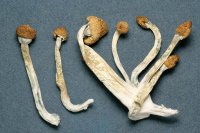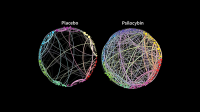
How Psychedelic Therapy Could Help Solve The Opioid Crisis

More Americans are currently dying from drug overdoses each year than died from AIDS at the peak of the epidemic. To be precise, there were over 60,000 overdose deaths in 2016, while roughly 43,000 people died from AIDS in 1995, the disease’s deadliest year. For a bit more context, 58,000 American soldiers were killed in the entirety of the Vietnam War. And while current efforts to curb this tragic trend are clearly failing, evidence suggests psychedelics may offer a unique tool to help bring the situation under control.
The alarming rise in overdoses appears to be driven predominantly by spiralling rates of addiction to prescription opioids. This, in turn, is leading many to begin using street drugs like heroin when their prescriptions are terminated. As a result, large numbers of people are unwittingly ingesting dangerous adulterants like fentanyl, which is said to be many times more powerful than heroin and can very easily cause an accidental overdose.
Treating addiction is not easy, and the condition remains poorly understood. Withdrawal symptoms from opioids tend to be intense, which means physical dependence on these substances plays a major role in perpetuating drug use. Yet as Johann Hari points out, addiction is as much a malady of the soul as it is of the body. To illustrate his point, he cites Bruce Alexander’s famous ‘Rat Park’ experiment, in which rats raised in solitary confinement displayed a high propensity to become addicted to cocaine-laced water, while those that were allowed to interact and mate with other rats virtually always chose regular drinking water over the cocaine solution.
Drawing parallels between the Rat Park and human examples, Hari concludes that addiction is very often caused by a lack of meaningful connections, both to other people and to one’s self – which is exactly where psychedelics come in.
The Beckley/Imperial Research Programme’s recent study into the efficacy of psilocybin-assisted psychotherapy for depression produced some amazing results, with 67% of participants remaining depression-free a week after their treatment, and 42% remaining so three months later. By analyzing patients’ reports, it’s clear that these improvements were precipitated by increased feelings of connectedness after using psilocybin.
When asked to describe the emotional experience of psilocybin-assisted psychotherapy, one patient replied: “This connection, it’s just a lovely feeling . . . this sense of connectedness, we are all interconnected, it’s like a miracle!” This was a common theme among nearly all responses, with another participant saying “I was absolutely connected to myself, to every living thing, to the universe.”
It is perhaps unsurprising, then, that psychedelics have in the past showed promise at treating addictions. Back in the 1970s, before the war on drugs was upscaled and a global blackout enforced on psychedelic research, a study by Savage and McCabe found that 25% of opioid-addicted participants were able to achieve abstinence after LSD-assisted psychotherapy, compared to just 5% who had been given a placebo.
Though little similar research has been conducting in the intervening decades, the Beckley Foundation is currently preparing to carry out a new study at the University of New Mexico into the potential of LSD to help treat alcoholism. If results are positive, this could pave the way for more research into the use of LSD-assisted psychotherapy for a range of addictions, including those involving opioids.
Another substance which has shown immense potential in this regard is ibogaine, a psychedelic alkaloid found in the root bark of the iboga plant. Its therapeutic potential was first discovered by Howard Lotsof, who was struggling with an opioid use disorder when he tried ibogaine back in 1962. To his amazement, he found that he was completely free from all opioid withdrawals and cravings after using ibogaine. Subsequent studies appeared to confirm this effect, with one paper showing that 86% of patients were relieved of their withdrawals immediately after being treated with ibogaine.
Unfortunately, ibogaine research has been so limited that we are still unsure of how exactly it affects the brain in order to eliminate the powerful withdrawal symptoms often experienced by opioid users. Yet as the overdose crisis deepens in the US, the revival of psychedelic science could soon provide new and highly effective treatments for various addictions, preventing yet more damage from being done.
Words: Benjamin Taub
Podcast
- All
Links
- All
Support
- All
BIPRP
- All
Science Talk
- All
Amanda's Talks
- All
- Video Talk
- Featured
- 2016 Onwards
- 2011-2015
- 2010 and Earlier
- Science Talk
- Policy Talk
One-pager
- All
Music
- All
Amanda Feilding
- All
Events
- All
Highlights
- All
Psilocybin for Depression
- All
Current
- All
Category
- All
- Science
- Policy
- Culture
Substance/Method
- All
- Opiates
- Novel Psychoactive Substances
- Meditation
- Trepanation
- LSD
- Psilocybin
- Cannabis/cannabinoids
- Ayahuasca/DMT
- Coca/Cocaine
- MDMA
Collaboration
- All
- Beckley/Brazil Research Programme
- Beckley/Maastricht Research Programme
- Exeter University
- ICEERS
- Beckley/Sant Pau Research Programme
- University College London
- New York University
- Cardiff University
- Madrid Computense University
- Ethnobotanicals Research Programme
- Freiburg University
- Medical Office for Psychiatry and Psychotherapy, Solothurn
- Beckley/Sechenov Institute Research programme
- Hannover Medical School
- Beckley/Imperial Research Programme
- King's College London
- Johns Hopkins University
Clinical Application
- All
- Depression
- Addictions
- Anxiety
- Psychosis
- PTSD
- Cancer
- Cluster Headaches
Policy Focus
- All
- Policy Reports
- Advisory Work
- Seminar Series
- Advocacy/Campaigns
Type of publication
- All
- Original research
- Report
- Review
- Opinion/Correspondence
- Book
- Book chapter
- Conference abstract
- Petition/campaign
Search type



